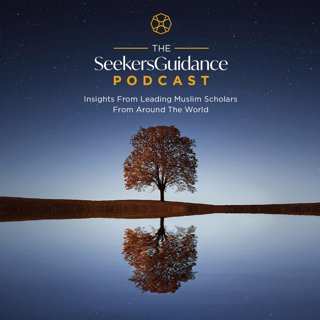
10 Steps to Firm-Footedness in Seeking Knowledge of Fiqh
In this brief podcast, Shaykh Faraz Rabbani provides 10 genuinely useful tips on gaining and retaining a firm grasp of your knowledge of fiqh. See also: "From knowing nothing to becoming a student of knowledge" Advice from Habib Ali Al-Jifri for Seekers of Knowledge The Etiquette of Seeking Knowledge Habib Umar's Advice to the Seekers of Sacred Knowledge Shaykh Áwwamah's advice for Students of Sacred Knowledge Importance of Intention in Seeking Knowledge
24 Jan 201930min

The Blessing of Knowledge, by Shaykh Faid Muhammad Said
Allah has promised that He will facilitate the path to Jannah for anyone who embarks on the journey to seeking knowledge. Imagine being in the company of the “pious ones” in the Eternal Garden. Can you afford to lose out on this opportunity? Listen to Shaykh Faid Muhammad Said explain how clear and easy Allah has made this choice for us and start today by taking a free course with SeekersGuidance from the comfort of your own home.
24 Jan 201915min

Appreciating the Blessing of the Prophet (peace be upon him)- Shaykh Faraz Rabbani
In this Friday sermon, given at a historic mosque in Cape Town, Shaykh Faraz Rabbani encourages us to be more appreciative of the greatest blessings we possess: our vast of knowledge of the Prophet Muhammad(peace be upon him). Knowledge of the Prophet(peace be upon him) enriches our day-to-day lives, and gives our family, social and personal lives so much more meaning. Citing the example of Cape Town, whose Muslims were persecuting in horrific ways for decades, Shaykh Faraz points out how they not only remained Muslims, but remained steadfast in their knowledge of Islam and their love for the Prophet (peace be upon him). Their great appreciation of this blessing was their motivation to hold onto it. We should regularly thank Allah for this blessing, as He called us to do frequently. The Prophet (peace be upon him) taught us how to do the smallest actions in the most beautiful way. He taught us to put on our shoes, to drink water, and to clean ourselves in the most beautiful way. We should look at our money with gratitude, as well as our free time. By living gratitude, we can taste the beauty of the message, and direct our blessings for good. For more podcasts by SeekersHub, visit seekersguidance.org/podcasts/
11 Jan 201916min

Purifying the Hearts- Ustadh Amjad Tarsin
In a Friday sermon given in Cape Town, Ustadh Amjad Tarsin reminds us about the relationship between the believers and the state of their hearts, to their connection with Allah. He quotes the hadith, “The Messenger of Allah(peace be upon him), said, “Verily, Allah does not look at your appearance or wealth, but rather he looks at your hearts and actions.” (Sahih Muslim) Traits such as humility, gratitude, trust in Allah, are some of these traits that can adorn our hearts. So many people spend so much time worrying about their appearance, wealth or property. Imam al-Ghazali asks, “How much time do you spend adorning your heart?” The Prophet(peace be upon him) was sent to a people who had many social ills in their society, and said, “I was sent to perfect character.” Examples include Umar ibn al-Khattab, who was a person of harshness before Islam. Afterward, he completely changed. Now, 1400 years later, people’s hearts are still being transformed by him. There is no greater way to Allah’s pleasure than working towards purifying our hearts. True knowledge is passed through embodiment, not merely through books. This is why we are called to venerate the scholars and elders, so that we may learn from them. For more podcasts by SeekersHub, visit seekershub.org/podcast
11 Jan 201922min

The Righteous Scholar A Person of Knowledge and Action – Shaykh Faraz Rabbani
The Mahabbah Foundation of Cape Town, South Africa, has organized a tour featuring Habib Umar bin Hafiz and a number of other scholars. You can find the full program with times and dates on their Facebook page here. As part of the tour, Habib Umar asked Shaykh Faraz Rabbani to address the scholars who were present in Johannesburg. The subject of the address was the definition of a righteous scholar (or, a true Sufi) as, "A person of knowledge who acted upon their knowledge, so Allah granted them knowledge of what they didn't know." Shaykh Faraz Touched upon the three aspects of this definition of what constitutes a true scholar, with some practical counsel. The three aspects being knowledge action state with Allah. For more on the tour, please check this: https://www.facebook.com/MahabbahFoundationSA/photos/habib-umar-tour-south-africa-january-2019habib-umar-will-be-touring-south-africa/1728308887291153/ May Allah bless, protect, and preserve the knowledge of this umma in our beloved scholars and righteous believers, and benefit all Muslims through them, amin.
9 Jan 201918min

Begin Right, Begin with Light: New Year Reflection for 2019 from Shaykh Faraz Rabbani
Start your year with reflecting on how to see things around you for what they are. Start to look at things differently with the eye of faith, cognizant of divine manifestations in all their ways. Know the three keys of beginning your year right in this inspiring reminder from Shaykh Faraz Rabbani. ".. So we ask Allah, Most Sublime, that we enter this new year, reminding ourselves of the call of the beloved of Allah, the embodiment, of what it means to know Allah, to behold Allah, to love Allah--such as he is known as the beloved of Allah--who said, Allah’s peace and blessing be upon him: “Renew your faith”. How do we renew our faith? Make everything we do an act of turning to Allah.” For more podcasts by SeekersHub, visit seekershub.org/podcasts
1 Jan 20199min

Significance of the Adhan and its Being a Metaphor and Reminder of Life and Death – Shaykh Asim Yusuf
In this Friday khutba Dr. Asim Yusuf begins by giving a brief history how the adhan came about to be the call to prayer for the Muslims. The companions dreamt the words of the adhan. One should reflect on the significance of the adhan. Nothing in our religion came about randomly. Rather, our religion come from the Hakim (The Wise), and is never bereft of wisdom. Men should be giving the adhan and the iqama before praying. Adhan is a form of dhikr (remembrance) that should be done five times a day. Reflect on the symbolism of the adhan. The adhan is recommended outside of the performance of the prayer one of these times is when a baby is born. The adhan is a call to prayer, but to which prayer is the baby being called to? It’s a call to their own janaza prayer, which is a prayer performed without adhan. Adhan is a remembrance of death and what follows it. Instinctively we know that there is something after death. Every human has some belief about the afterlife. Even those who don’t believe in God. Remembering death frequently is not a negative thing. The adhan is a remembrance for the stages of the afterlife. The adhan is direct sequential reminder in the moments after death. Religion is here to remind us there is a dawn coming, and you need to prepare for the day after which there are no more days. Worship at its core is not an action. Action is how worship is expressed. Worship at its core is a realization and internal reorientation.
15 Dec 201821min

Reflect on the Signs Around You – Shaykh Faraz Rabbani
In this Friday khutba Shaykh Faraz begins by reminding the believers to appreciate the signs around one. There are verses about those signs that the Prophet (peace and blessings be upon him) would recite regularly upon waking for his night prayer. "Indeed, in the creation of the heavens and the earth and the alternation of the day and night there are signs for people of reason. ˹They are˺ those who remember Allah while standing, sitting, and lying on their sides, and reflect on the creation of the heavens and the earth ˹and pray˺, “Our Lord! You have not created ˹all of˺ this without purpose. Glory be to You! Protect us from the torment of the Fire." [Sura al-Imran: 3:190-191] All of Allah’s creating should remind one of The Creator. He is kind, caring, just, and all-knowing. One of the basic proofs of God is everything besides Allah is given to change. Anything given to change points to a creator. People of insight look at not just forms, but look at the reality of things. The Prophet (peace and blessings be upon him) was constantly in the remembrance of Allah. Make a habit to pause and look with the eye of reflection. The prophetic gaze was reflecting. For more podcasts by SeekersHub, visit seekershub.org/podcasts .
11 Dec 201828min





















